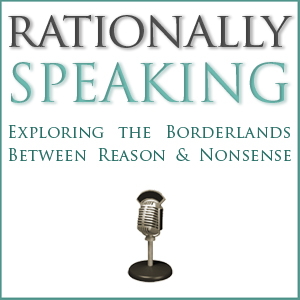Rationally Speaking #35 - What is Philosophy of Science Good for?
Rationally Speaking Podcast
New York City Skeptics
4.6 • 787 Ratings
🗓️ 22 May 2011
⏱️ 49 minutes
🧾️ Download transcript
Summary
In this episode we explore philosophy of science: What is it about, and should it matter to scientists? Massimo and Julia also discuss some of the most important questions in philosophy of science now, and some historical debates between leading philosophers of science, like Thomas Kuhn and Karl Popper, over how science should or does work.
So is philosophy of science, as Richard Feynman famously quipped, "as useful to scientists as ornithology is to birds?" Or was philosopher Daniel Dennett closer to the truth when he said, "There is no such thing as philosophy-free science, only science whose philosophical baggage is taken on-board unexamined?"
Transcript
Click on a timestamp to play from that location
| 0:00.0 | Rationally speaking is a presentation of New York City skeptics dedicated to promoting critical thinking, skeptical inquiry, and science education. |
| 0:22.6 | For more information, please visit us at NYCCEptics.org. |
| 0:30.9 | Welcome to rationally speaking, the podcast where we explore the borderlands between reason and nonsense. |
| 0:40.8 | I am your host, Massimo Filucci. |
| 0:42.8 | And with me, as always, is my co-host, Julia Galev. |
| 0:45.6 | Julia, what are we going to talk about today? |
| 0:47.8 | Masimo, in this episode, we're asking, what is philosophy of science good for? |
| 0:51.9 | Oh, boy. |
| 0:52.4 | Philosophy of science is a subfield of philosophy that scrutinizes the overall methodology of science, |
| 0:58.5 | what its goals are, what its assumptions are. |
| 1:01.7 | And it also deals with questions from particular disciplines of science like biology or physics, |
| 1:06.2 | not with the intention of actually solving empirical questions in those fields, |
| 1:09.2 | but instead figuring out what the |
| 1:11.2 | right questions are that we should be asking and how we should interpret the empirical findings |
| 1:15.5 | that the scientists gather. Philosophy of Science also happens to be the domain of my excellent |
| 1:20.5 | co-host, Massimo Piliucci. So Massimo, how was that definition? Do you want to add to it? |
| 1:25.1 | That sounds good as a starting point. Actually, what brought up the topic for this podcast is an interview that I read recently with |
| 1:32.7 | Alex Rosenberg, who is author of one of the most prominent philosophy of science textbooks |
| 1:38.7 | out there. It's called Philosophering Introduction, published by Rutledge. |
| 1:43.3 | And so Rosenberg was, because the new version of his book is coming out, he was interviewed |
| 1:49.2 | and asked various questions about philosophy science. |
| 1:53.1 | I mean, we obviously are not going to go through the interview. |
... |
Please login to see the full transcript.
Disclaimer: The podcast and artwork embedded on this page are from New York City Skeptics, and are the property of its owner and not affiliated with or endorsed by Tapesearch.
Generated transcripts are the property of New York City Skeptics and are distributed freely under the Fair Use doctrine. Transcripts generated by Tapesearch are not guaranteed to be accurate.
Copyright © Tapesearch 2025.

